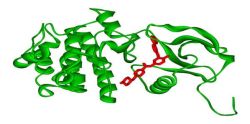A blood profiling technique has uncovered four new biomarkers that improve the prediction of risk for heart attack or stroke within the next 15 years. The study has been published in the journal Circulation.
The blood screening technology can help doctors identify people who would benefit from early treatment. In addition, the high-throughput profiling of circulating metabolites can also improve prediction of cardiovascular risk.
A team of scientists at the University of Oulu, Finland screened 13,441 blood samples of healthy people from Finland and the UK. They screened for 68 biomarkers and followed the health status of the volunteers for over a decade. The scientists looked for measures in the blood that could reflect a heart attack or a stroke. They found four biomarkers that were indicative of future cardiovascular disease risk independently of known risk factors.
The scientists used a method that was based on Nuclear Magnetic Resonance (NMR) spectroscopy. This method enables determination of over 200 biomarkers for body metabolism from a single sample of blood. The technique is already being used for metabolic screening across Europe.
The team measured the metabolites in a single experimental setup. This allowed for the simultaneous quantification of routine lipids, total lipid concentrations, fatty acid composition and polyunsaturated fatty acids, glycolysis precursors, ketone bodies and amino acids. 679 samples were additionally profiled with liquid-chromatography mass spectrometry.
The four markers that were identified include phenylalanine, a common amino acid and the amount of monounsaturated fat in the blood. Higher concentrations of these were linked with higher disease risk. High levels of omega-3 and omega-6 fatty acids were linked with lower risk for cardiovascular disease.
According to Peter Würtz, PhD, the lead author, “These new biomarkers can help to better assess the complex molecular processes behind the development of cardiovascular disease. The improved prediction of cardiovascular risk also suggests cost savings in healthcare by advanced biomarker profiling. The low-cost blood screening technology opens a treasure trove to understand the molecular mechanisms of heart disease and other metabolic diseases.”
Source: Circulation
Image Credit: Wikimedia Commons























